

Changes Middle Class. Social Media Censorship Offers Clues to China’s Plans. In February last year, political scandal rocked China when the fast-rising politician Bo Xilai suddenly demoted his top lieutenant, who then accused his boss of murder, triggering Bo's political downfall.
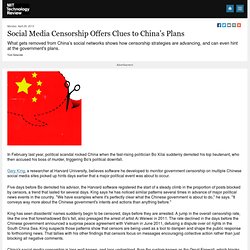
Gary King, a researcher at Harvard University, believes software he developed to monitor government censorship on multiple Chinese social media sites picked up hints days earlier that a major political event was about to occur.
China censors Taiwan Leader. 24 hours ago, Sina Weibo, China’s leading microblogging service, verified that Frank Hsieh, former presidential nominee of Taiwan’s pro-independence Democratic Progressive Party (DPP), opened an account @謝長廷 on China’s most prominent social media platform. 24 hours later, the account has already been deleted, including two rumored re-opened accounts @謝謝-長廷 and @臺北謝氏.
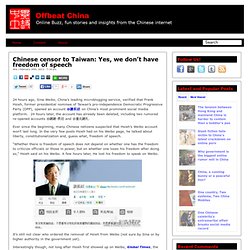
Ever since the beginning, many Chinese netizens suspected that Hsieh’s Weibo account won’t last long. In the very few posts Hsieh had on his Weibo page, he talked about liberty, constitutionalization and, guess what, freedom of speech. Asia Democracy Index. The keenly anticipated Asia Democracy Index (ADI) was launched on 17 September at the World Forum for Democratization for Asia (WFDA) conference that was held in Taipei, Taiwan.
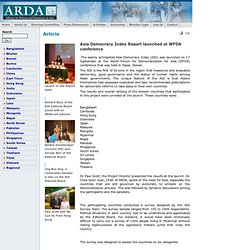
The ADI is the first of its kind in the region that measures and evaluates democracy, good governance and the status of human rights among Asian governments. The unique feature of the ADI is that Asians themselves had assessed evaluated and also recommended prescriptions for democratic reforms to take place in their own countries. The results and overall ranking of the sixteen countries that participated in this project were unveiled at the launch. These countries were: BangladeshCambodiaHong KongIndonesiaJapanMalaysiaMongoliaMyanmarNepalPakistanPhilippinesSouth KoreaSri LankaSingaporeTaiwanThailand Dr. The participating countries conducted a survey designed by the ADI Survey Team. The survey was designed to assess the countries on six categories:
Journalism in India. By Index on Censorship The media’s infatuation with a single narrative is drowning out the country’s diversity, giving way to sensationalist reporting and “paid for” news.
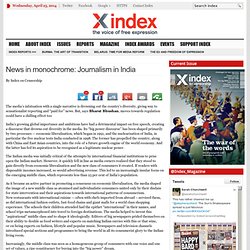
But, says Bharat Bhushan, moves towards regulation could have a chilling effect too. Internet Censorship Southeast Asia. Every time Le Anh Hung starts to write he thinks of his three young children.
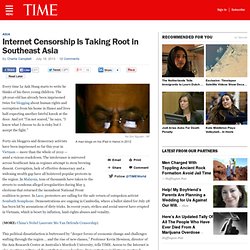
The 38-year-old has already been imprisoned twice for blogging about human rights and corruption from his home in Hanoi and lives half-expecting another fateful knock at the door. And yet “I’m not scared,” he says, “I know what I choose to do is risky but I accept the fight.” Kazakhstan. Download Files Download the complete 114-page report. 582.93 KB pdf Download the complete 126-page report in Kazakh. 2.73 MB pdf Download the complete 120-page report in Russian. 2.67 MB pdf The Mapping Digital Media project examines the global opportunities and risks created by the transition from traditional to digital media.
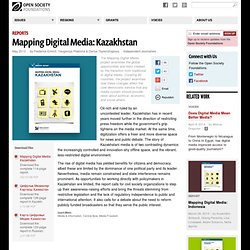
Internet and Social Media in Asia. Recent developments and advancements on the Internet in Asia, including the tremendous growth in Internet accessibility and the use of social media, have created an unprecedented platform and space for free speech and opinions particularly in less open societies in the region.
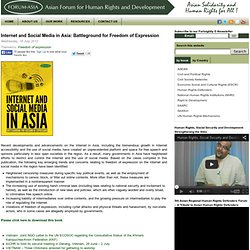
As a result, many governments in Asia have heightened efforts to restrict and control the Internet and the use of social media. Based on the cases compiled in this publication, the following key emerging trends and concerns relating to freedom of expression on the Internet and social media in the region have been identified: Heightened censorship measures during specific key political events, as well as the employment of mechanisms to censor, block, or filter out online contents. Please click here to download this book Other Items on East Asia Country Programme,South Asia Country Programme. Unblocking Censorship China. Censorship on Sina Weibo, an immensely popular Chinese social media platform much like a combination of Facebook and Twitter, has gotten much more complicated in recent months.
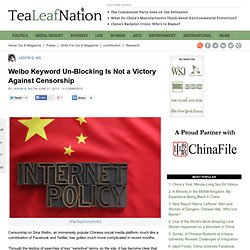
Through the testing of searches of key “sensitive” terms on the site, it has become clear that some previously-blocked search terms now return results. Don’t pop open bottles of champagne to celebrate a decrease in censorship yet, however: an examination of available search results shows that it is instead merely a shift in tactics. The implementation of more targeted, subtler censorship – including the sanitization of keyword search results to remove unwanted content – makes the suppression of information more invisible, and harder to fight.
The change has seemingly been gradual, but more starkly came to light recently as scholars and organizations studying censorship found that Sina Weibo was no longer blocking searches for the word “六四” a common way to write June 4, the date of the Tiananmen Square crackdown. China new internet rules include jailtime. 9 September 2013Last updated at 08:56 ET People will be charged if their "online rumours" are visited by 5,000 users Chinese officials have issued new guidelines that could see internet users jailed for writing posts that spread rumours online, state media say.
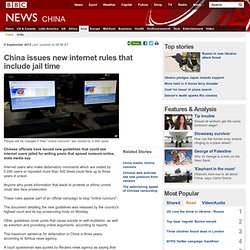
Internet users who make defamatory comments which are visited by 5,000 users or reposted more than 500 times could face up to three years in prison. Anyone who posts information that leads to protests or ethnic unrest could also face prosecution. These rules appear part of an official campaign to stop "online rumours".
The document detailing the new guidelines was released by the country's highest court and its top prosecuting body on Monday. Other guidelines cover posts that cause suicide or self-mutilation, as well as extortion and provoking online arguments, according to reports. China: Go viral, go to jail. China Is Waging A War On Online Rumors.